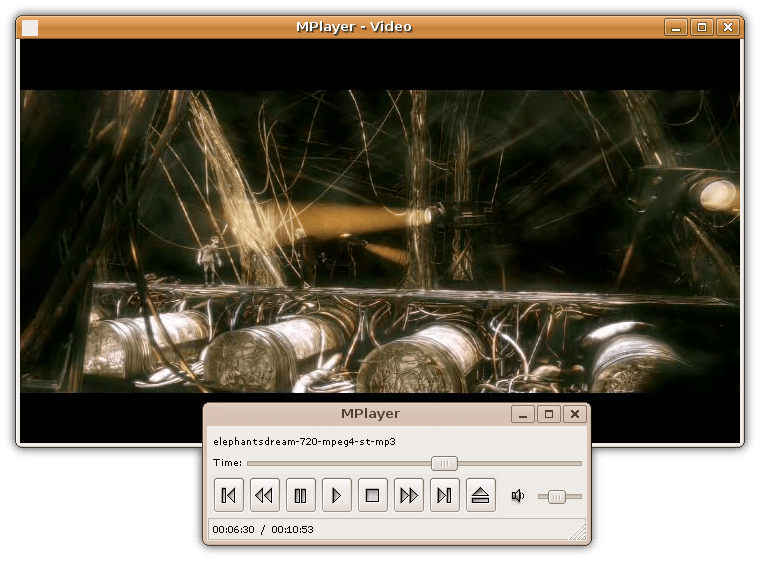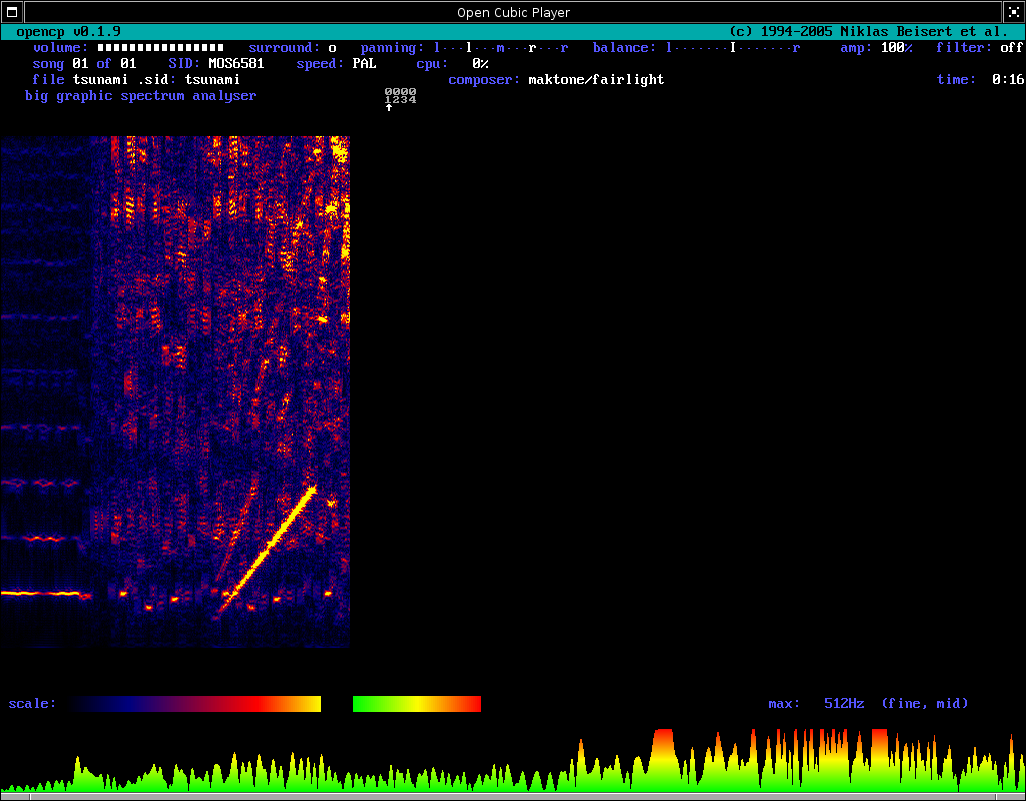|
ModPlug Player
ModPlug Player is a module file player developed by Olivier Lapicque in conjunction with the original ModPlug Tracker project and the ''ModPlug'' Browser plugin. Features include a playlist editor, graphical equalizer, automatic gain control, bass expansion, reverb, Dolby Surround Sound support and the ability to mix two modules simultaneously and to change their pitch and tempo. The player supports a variety of module music files in both native and compressed (ZIP / RAR / LHA) formats. The software was originally developed along with ''ModPlug Tracker'', now known as OpenMPT, and modernized ModPlug engine is now used for decoding module files in OpenSource multimedia framework gstreamer under the name libmodplug. at ...
|
Module File
Module file (MOD music, tracker music) is a family of music file formats originating from the MOD file format on Amiga systems used in the late 1980s. Those who produce these files (using the software called music trackers) and listen to them form the worldwide MOD scene, a part of the demoscene subculture. The mass interchange of "MOD music" or "tracker music" (music stored in module files created with trackers) evolved from early FIDO networks. Many websites host large numbers of these files, the most comprehensive of them being the Mod Archive. Nowadays, most module files, including ones in compressed form, are supported by most popular media players such as VLC, Foobar2000, Exaile and many others (mainly due to inclusion of common playback libraries such as libmodplug for gstreamer). Structure Module files store digitally recorded samples and several "patterns" or "pages" of music data in a form similar to that of a spreadsheet. These patterns contain note numbers, in ... [...More Info...] [...Related Items...] OR: [Wikipedia] [Google] [Baidu] |
Media Player (software)
Media player software is a type of application software for playing multimedia computer files like audio and video files. Media players commonly display standard media controls, media control icons known from physical devices such as tape recorders and Compact Disc player, CD players, such as play ( ), pause ( ), fastforward (⏩️), backforward (⏪), and stop ( ) buttons. In addition, they generally have progress bars (or "playback bars"), which are Slider (computing), sliders to locate the current position in the duration of the media file. Mainstream operating system, operating systems have at least one default media player. For example, Windows comes with Windows Media Player, Microsoft Movies & TV and Groove Music, while macOS comes with QuickTime Player and Music (software), Music. Linux distributions come with different media players, such as SMPlayer, Amarok (software), Amarok, Audacious (software), Audacious, Banshee (media ... [...More Info...] [...Related Items...] OR: [Wikipedia] [Google] [Baidu] |
OpenMPT
OpenMPT is an open-source audio module tracker for Windows (with an intended Wine-functionality for UNIX and Linux x86-systems). It was previously called ModPlug Tracker, and was first released by Olivier Lapicque in September 1997. ''Computer Music'' magazine listed OpenMPT among the top five free music trackers in 2007, and it is one of the most widely used trackers. History MOD Plugin and ModPlug Tracker OpenMPT was initially developed as a browser plug-in called MOD Plugin, which enabled users to play music and other sounds encoded in module files. ModPlug Tracker, along with a player application named ModPlug Player, evolved from this plug-in. In December 1999, Olivier Lapicque sent the module-playing parts of ModPlug Tracker's source code to Kenton Varda, under the GPL-2.0-or-later, to write a plugin for XMMS based on the code. In 2001, the source code was released in the public domain, [...More Info...] [...Related Items...] OR: [Wikipedia] [Google] [Baidu] |
Browser Plugin
A browser extension is a small software module for customizing a web browser. Browsers typically allow a variety of extensions, including user interface modifications, HTTP cookie, cookie management, ad blocking, and the custom userscript, scripting and Style sheet (web development), styling of web pages. Plug-ins Browser plug-in (computing), plug-ins are a separate type of module. The main difference is that extensions are distributed as source code, while plug-ins are distributed as executables (i.e. object code). Plug-ins are no longer supported by the major browsers, but extensions are widely used. The most popular browser, Google Chrome, has over 100,000 extensions available but stopped supporting plug-ins in 2020. History Internet Explorer was the first major browser to support extensions, with the release of Internet Explorer 4, version 4 in 1999. Firefox has supported extensions since its launch in 2004. Opera (web browser), Opera began supporting extensions in 2009, and bo ... [...More Info...] [...Related Items...] OR: [Wikipedia] [Google] [Baidu] |
Wired (magazine)
''Wired'' (stylized as ''WIRED'') is a monthly American magazine, published in print and online editions, that focuses on how emerging technologies affect culture, the economy, and politics. Owned by Condé Nast, it is headquartered in San Francisco, California, and has been in publication since March/April 1993. Several spin-offs have been launched, including '' Wired UK'', ''Wired Italia'', ''Wired Japan'', and ''Wired Germany''. From its beginning, the strongest influence on the magazine's editorial outlook came from founding editor and publisher Louis Rossetto. With founding creative director John Plunkett, Rossetto in 1991 assembled a 12-page prototype, nearly all of whose ideas were realized in the magazine's first several issues. In its earliest colophons, ''Wired'' credited Canadian media theorist Marshall McLuhan as its "patron saint". ''Wired'' went on to chronicle the evolution of digital technology and its impact on society. ''Wired'' quickly became recognized ... [...More Info...] [...Related Items...] OR: [Wikipedia] [Google] [Baidu] |
Reverb
Reverberation (also known as reverb), in acoustics, is a persistence of sound, after a sound is produced. Reverberation is created when a sound or signal is reflected causing numerous reflections to build up and then decay as the sound is absorbed by the surfaces of objects in the space – which could include furniture, people, and air. This is most noticeable when the sound source stops but the reflections continue, their amplitude decreasing, until zero is reached. Reverberation is frequency dependent: the length of the decay, or reverberation time, receives special consideration in the architectural design of spaces which need to have specific reverberation times to achieve optimum performance for their intended activity. In comparison to a distinct echo, that is detectable at a minimum of 50 to 100 ms after the previous sound, reverberation is the occurrence of reflections that arrive in a sequence of less than approximately 50 ms. As time passes, the amplitude of t ... [...More Info...] [...Related Items...] OR: [Wikipedia] [Google] [Baidu] |
OpenSource
Open source is source code that is made freely available for possible modification and redistribution. Products include permission to use the source code, design documents, or content of the product. The open-source model is a decentralized software development model that encourages open collaboration. A main principle of open-source software development is peer production, with products such as source code, blueprints, and documentation freely available to the public. The open-source movement in software began as a response to the limitations of proprietary code. The model is used for projects such as in open-source appropriate technology, and open-source drug discovery. Open source promotes universal access via an open-source or free license to a product's design or blueprint, and universal redistribution of that design or blueprint. Before the phrase ''open source'' became widely adopted, developers and producers have used a variety of other terms. ''Open source'' gaine ... [...More Info...] [...Related Items...] OR: [Wikipedia] [Google] [Baidu] |
Gstreamer
GStreamer is a pipeline-based multimedia framework that links together a wide variety of media processing systems to complete complex workflows. For instance, GStreamer can be used to build a system that reads files in one format, processes them, and exports them in another. The formats and processes can be changed in a plug and play fashion. GStreamer supports a wide variety of media-handling components, including simple audio playback, audio and video playback, recording, streaming and editing. The pipeline design serves as a base to create many types of multimedia applications such as video editors, transcoders, streaming media broadcasters and media players. It is designed to work on a variety of operating systems, e.g. the BSDs, OpenSolaris, Android, macOS, iOS, Windows, OS/400. GStreamer is free and open-source software subject to the terms of the LGPL-2.1-or-later and is being hosted at freedesktop.org. Distribution and adoption The GNOME desktop environment, a hea ... [...More Info...] [...Related Items...] OR: [Wikipedia] [Google] [Baidu] |
GitHub
GitHub, Inc. () is an Internet hosting service for software development and version control using Git. It provides the distributed version control of Git plus access control, bug tracking, software feature requests, task management, continuous integration, and wikis for every project. Headquartered in California, it has been a subsidiary of Microsoft since 2018. It is commonly used to host open source software development projects. As of June 2022, GitHub reported having over 83 million developers and more than 200 million repositories, including at least 28 million public repositories. It is the largest source code host . History GitHub.com Development of the GitHub.com platform began on October 19, 2007. The site was launched in April 2008 by Tom Preston-Werner, Chris Wanstrath, P. J. Hyett and Scott Chacon after it had been made available for a few months prior as a beta release. GitHub has an annual keynote called GitHub Universe. Organizational ... [...More Info...] [...Related Items...] OR: [Wikipedia] [Google] [Baidu] |
List Of Amiga Music Format Players
This is a list of software for various operating systems for playing Amiga music formats. *Audacious (various third party plugins have been written to play Amiga formats) * DeliPlayer * Dual Module PlayerFlash MOD Player (AS3)- A fully featured module player targeted at game developers. FlashMod Player (Alchemy/AS3)- A simple multiplattform modplayer using Flash. * Foobar2000 (various third party plugins have been written to play Amiga formats) *''InertiaPlayer'' - one of the earliest PC MOD players released in 1993 tp://ftp.pl.scene.org/vol/rzm1/simtelnet/msdos/sound/iplay10b.zip Inertiaplayer 1.0b''100% Assembler ..up to 32 channels ..This player was released 24 Dec '93, while you where singing in church'' (iplay.doc)JavaMod- A multiplattform modplayer using javahxMikMod a haXe/Flash port of libmikmod *MikMod *ModPlug PlayerNostalgicPlayerWindows player by the same author as APlayer on the AmigaChron-O-LooWeb/WebAudio player based on UADEOpenCubicPlayer- GPL licensed and one ... [...More Info...] [...Related Items...] OR: [Wikipedia] [Google] [Baidu] |



